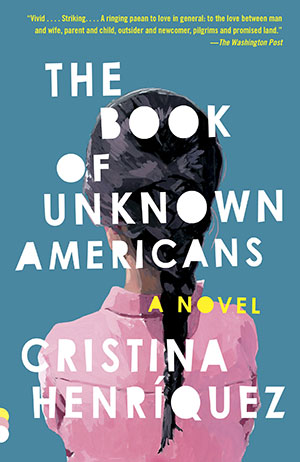2023 Jamison Lecture
/prod01/twu-cdn-pxl/media/images/jamison-lecture/cristinahenriquez-wide.jpg)
Author Cristina Henríquez:
bringing immigrant stories to life
Thursday, April 13, 2023, 7 p.m.
Phyllis J. Bridges Auditorium in the Student Union at Hubbard Hall
Award-winning author Cristina Henríquez brings to life the human stories behind the immigration debate in The Book of Unknown Americans. For aspiring writers, she will also speak to the creative and technical writing process as well as developing intriguing and authentic characters.
- The lecture is free and open to the public. Registration is required.
- A question-and-answer session will follow the lecture.
- The first 50 people to arrive at the lecture will receive a free, signed copy of Henríquez's book, The Book of Unknown Americans.
Register for the Jamison Lecture
The Jamison Lecture is part of the Paup Lecture Series.
Cristina Henríquez

Cristina Henríquez is the author of The Book of Unknown Americans, which was a New York Times Notable Book of 2014 and one of Amazon’s Top 10 Books of the Year. It was the Daily Beast Novel of the Year, a Washington Post Notable Book, an NPR Great Read, and was chosen one of the best books of the year by BookPage, Oprah.com, and School Library Journal. It was also longlisted for the Andrew Carnegie Medal for Excellence in Fiction.
Henríquez is also the author The World In Half (a novel), and Come Together, Fall Apart: A Novella and Stories, which was a New York Times Editors’ Choice selection. Henríquez earned her undergraduate degree from Northwestern University and is a graduate of the Iowa Writers’ Workshop. She lives in Chicago.
Moderator Christina Bejarano

Christina Bejarano is a professor of Political Science and a Jane Nelson Institute for Women’s Leadership faculty scholar at Texas Woman’s University. She is an author, speaker and advisor on Latina electoral politics in the U.S.
Bejarano’s academic interests are in American politics, in the areas of gender, race/ethnicity, and political behavior. Her research examines the conditions under which racial/ethnic minorities and women successfully compete for U.S. electoral office, which is reflected in her book on Latina political candidates, The Latina Advantage: Gender, Race, and Political Success. Bejarano’s work also focuses on how racial/ethnic minorities and women can shape or influence the electoral environment, which is reflected in her second book, The Latino Gender Gap in U.S. Politics.
Her research on American gender politics has also been published in journals such as Politics & Gender; Political Research Quarterly; Journal of Women, Politics & Policy, as well as multiple book chapters.
Bejarano served on the national advisory council for LatinasRepresent, a joint initiative working to increase Latina political leadership and representation. She received her PhD and MA in political science from the University of Iowa and her BA in psychology from the University of North Texas.

Praise for The Book of Unknown Americans
“Timely . . . powerful . . . genuinely moving . . . a chronicle of a beautiful Mexican teenager named Maribel Rivera and her admiring friend and neighbor, Mayor Toro. Maribel and Mayor’s star-crossed love lends this novel an emotional urgency; the story of their families gives us a visceral sense of the magnetic allure of America, and the gaps so many immigrants find here between expectations and reality. In slowly revealing the back stories behind [their] arrival in America and what they have at stake in remaining here, Henríquez gives us an intimate understanding of the sense of dislocation they experience almost daily, belonging neither here nor there, caught on the margins of the past and the future. She conveys the homesickness they feel—missing not just family and friends but also the heat and light and rhythms of the places they left behind—and their awareness of the fragility of even their most ordinary dreams of safety. The story encapsulate[s] the promises and perils of the American dream . . . Henríquez’s myriad gifts as a writer shine.” —Michiko Kakutani, The New York Times
“Henríquez distills the vast sea of immigrant stories into a small apartment building community in Delaware. At the center are two star-crossed teens, Mayor and Maribel . . . Through their friendship and budding romance, Mayor becomes a hero, protecting Maribel from a dangerous boy. He starts to bring her out of her shell [and] Maribel begins to reconnect with her former self. Their doomed love is just one of the Romeo & Juliet twists in the book—Henríquez threads that theme through the relationships between parents and their children, husbands and wives, the immigrant community with their home countries and their new one . . . Through her unadorned prose, these struggles ring clear, voices rising above the din of political debate.” —Korina Lopez, USA Today
“Gripping . . . genuinely devastating. Henríquez has found a memorable way to open up complex topics—discrimination, love and grief in family life, and the experiences of being displaced or feeling at home. A novel that can both make you think and break your heart.” —Sarah Stone, San Francisco Chronicle
“Reminiscent of the chorus of voices that made Oscar Lewis’s The Children of Sanchez so memorable, and Arundhati Roy’s The God of Small Things so profoundly humane, Henríquez’s tale about coming to America is a striking original . . . It’s no easy trick to pull a good story from the classic immigrant chronicle, the striver’s tale. But this novel about the Riveras and their hastily cobbled world is sure to bring Henríquez many readers. It is a deeply stirring story about a budding romance between two unlikely lovers, but also a ringing paean to love in general: to the love between man and wife, parent and child, outsider and newcomer, pilgrims and promised land. With a simple, unadorned prose that rises to the level of poetry, Henríquez achieves the seemingly impossible: Without a trace of sentimentality, without an iota of self-indulgence or dogma, she tells us about coming to America. The Book of Unknown Americans leaves you in thrall to its vivid characters and its author’s sure hand.” —Marie Arana, Washington Post
“In a TED talk titled ‘The Danger of a Single Story,” Nigerian novelist Chimamanda Ngozi Adichie noted that ‘the problem with stereotypes is not that they are untrue, but that they are incomplete.’ Henríquez’s big-hearted novel challenges the ‘single story’ by exploring a wide range of Latino experiences. The Book of Unknown Americans is a welcome contribution to a broadening literary conversation that features immigrants from all across the Americas, and all walks of life. As Henríquez shows, theirs is a story composed of many stories.” —Ashley Hope Pérez, Texas Observer
“There’s an aura of benevolence in these pages that feels honestly come by, stemming in part from Mayor and Maribel’s innocent romance but mostly from the steady support and encouragement among the families—the charismatic residents of the Redwood Apartments in Delaware. ‘Who comes to the U.S. and ends up in Delaware?’, one [character] jokingly wonders . . . Henríquez’s feat is to make the reader feel at home amid these good, likeable people. Be warned: The price of this closeness is the book’s tragic conclusion.” —The Wall Street Journal
“I didn’t want to read another book about the immigrant experience. So ubiquitous in literature, the theme can feel tired and unoriginal, even to those of us who’ve lived it. But the first few paragraphs of Henríquez’s prose—words whose simplicity belies their weight—seduced me with beauty and the promise of a rich tale. And Henríquez delivered. This is a book about love, about how we seek to help those we love, sometimes with unforeseen and tragic consequences . . . Henríquez ignites the tension in the first few pages and lets it simmer and pull the story along . . . Lyrical . . . There is beautiful writing in these pages [that] illustrates the full ethnic range of the Americas and how so many people south of our border ended up here. I’m not spoiling it to say that Henríquez brings the story to a heart-crushing explosion of an end fueled by secrets, love, fear and ethnic tension. Bottom line, if you read only one more book about the immigrant experience, make it this one.” —Beatriz Terrazas, Dallas Morning News
“Observant . . . a bighearted ensemble of a story. Set at a scrappy apartment complex in Delaware, The Book of Unknown Americans is a pan-Latino novel, with characters from Panama, Venezuela, Mexico and Puerto Rico, among other nations. In love and locked out of any reasonably cool social scene in high school, Mayor Toro and Maribel Rivera are the teens at the heart of the novel. Interspersed among their tentative, fumbling love story are chapters devoted to the back stories of the other residents of the complex. Henríquez covers the gamut of the immigrant experience: how they arrived in America, why they came, what they think of their new home, whether they miss their first home. In other words, she captures an experience at the heart of this country’s history that is often a cursory, incomplete story in the media . . . Poor and at the mercy of forces they do not entirely understand, her characters nonetheless experience victories that no one but their families and the fellow residents of their complex share. ‘I hope this book can play a small role in maybe opening Americans a bit more to empathy,’ Henriquez says.” —Claiborne Smith, Kirkus
“The stories you hear about immigration are the ones that generate sensational headlines: sheriffs patrolling the border with shotguns, finger-pointing on Fox News, red-hot rhetoric in political campaigns across the country. But as Henríquez was reminded a few years ago, there are plenty of stories that are told rarely, if ever . . . At the center of The Book of Unknown Americans are Arturo and Alma Rivera, who have immigrated legally from Mexico to enroll their daughter in a special-needs school because she has suffered a brain injury. When Mayor Toro, a young naturalized citizen originally from Panama, falls in love with her, the Rivera and Toro families become forever intertwined . . . The Riveras’ vulnerability increases [and] ultimately the story spins toward tragedy. Along the way, Henríquez allows the characters to speak for themselves . . . The politics of immigration, while never explicitly argued, remain subtly in play, as do more existential matters affecting immigrants, such as mixed national and cultural allegiances and affiliations between the generations . . . Henríquez’s most ambitious book yet.” —Kevin Nance, Chicago Tribune
“A novel as disturbing as it is beautiful: a testament to the mixed blessings our country offers immigrants, who struggle against bigotry and economic hardship while maintaining just enough hope to keep striving for something better. A narrative mosaic that moves toward a heartrending conclusion.” —Daniel A. Olivas, The Los Angeles Review of Books
“Evoking a profound sense of hope, Henríquez delivers a moving account of those who will do anything to build a future for their children—even if it means confronting the fear and alienation lurking behind the American dream.” —Publishers Weekly
Register for the Jamison Lecture
Page last updated 4:44 PM, March 14, 2024